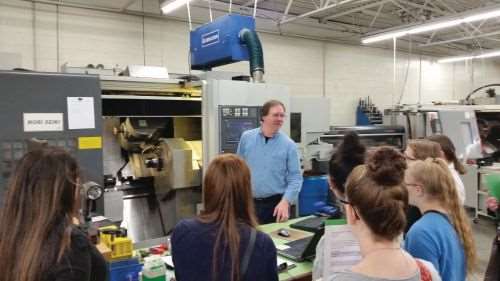Technical School Aims to Spark Interest in Female Students Pursuing STEM Careers
One school is reaching out to a demographic often neglected in the recruitment process for STEM careers: female students.
#workforcedevelopment
As concerns regarding the lack of interest in manufacturing careers for the upcoming high school graduates rise, one school is reaching out to a demographic often neglected in the recruitment process for STEM careers: female students. Thaddeus Stevens College of Technology, a 900-student technical college in Lancaster, Pennsylvania, is embarking on a new project, currently in the proposal stage with the National Science Foundation, designed to encourage and spark interest amongst female students in their pursuits of various careers within the STEM industries. Alex Surra, an instructor at Thaddeus Stevens College of Technology, discusses the origin of the program, the lack of female new hires in STEM industries and how he intends to get more prospective high school females interested in these careers.
PMPA: What is the inspiration behind this program?
Featured Content
Mr. Surra: All the projects we do on campus are industry-driven. This is our fi rst proposal to the National Science Foundation. The rationale is that women are typically making much less money than men. The statistics on STEM careers are eye opening, in that the difference in pay for someone pursuing a STEM-related career versus a liberal arts degree is signifi cant. In fact, 63 percent of associate degree holders in STEM jobs earn more than bachelor degree holders in non-STEM careers.
Men are more than twice as likely to pursue these careers. We believe that some of this pay gap and disparity is attributed to what types of careers women are encouraged to pursue by society. We’re hoping to change that and help women break through that glass ceiling with this program.
A big challenge for the Machine Tool and Computer-Aided Manufacturing program is recruiting, mainly because the general public is not as familiar with the machining industry as they are with other trades. When you take female students into account, the interest in pursuing a career path in machining is even lower. We typically only have one female student per year out of 25 students. More than half of the girls in a recent study said they don’t consider careers in STEM. We’re hoping to not only get students interested, but also try to change the paradigm against going into a trade.
What makes Thaddeus Stevens College of Technology the right school to implement this type of program?
There is a major pay gap between males and females in this country. The U.S. average is 78 cents for every dollar that men make, in Lancaster County women typically make 59 cents per dollar. We’re trying to change that pay gap. We’ve been here since 1905, and 60 percent of our students are socioeconomically disadvantaged and attend on grants. We have a 96 percent job placement rating campus wide. So, we’re looking at our stats and thinking, “We’re only really servicing half the population.” Most women are not pursuing these degrees. We’d really like to see that change, because it will lead to better equality in the workplace and increase the quality of life for many individuals.
Can you describe some of the programs you will be implementing for these female students?
We’re going to do multiple industry tours for female students. We’re going to take students through both manufacturing facilities and water treatment plants. We will then tour the shops on campus to show what we have to offer. Female students will be able to participate in a hands-on workshop on campus that encompasses the three majors that are involved in the grant: water and environmental technology, machine tool and electrical. We’re also going to do the industry tours for teachers and guidance counselors. Many guidance counselors are pushing students to go to a 4-year school and don’t consider these high-paying STEM careers. Reaching the educators who influence students’ decisions can help us improve the industry’s image for future generations.
Mr. Surra recommends working with local high schools, vocational schools and colleges to help build skilled talent in your own community.
RELATED CONTENT
-
Inventory Control Systems For The Shop
An ongoing effort towards more efficient operations drove this shop to take a closer look at indirect material usage, subsequently leading to implementation of a new system for tracking toolroom inventory.
-
Determine Passivation of Stainless
Properly cleaned stainless steel is naturally protected from corrosion by a thin, passive film. But this passive layer can be removed or scratched. A passivation meter measures the surface potential under controlled conditions.
-
SWOT for Employee Retention and Recruitment
What is your brand? Why should people want to work for your company? How can your brand improve? A SWOT analysis can help answer these questions — your employee retention and recruitment may count on it.







